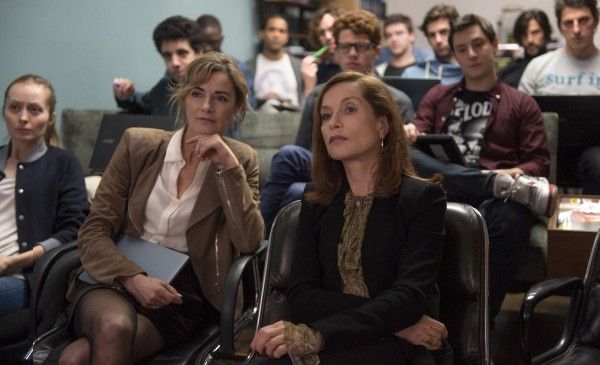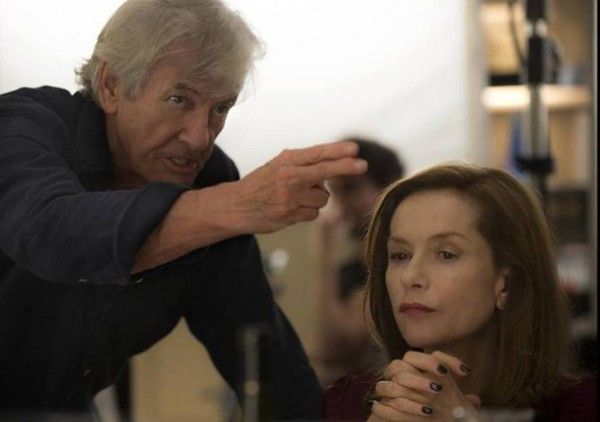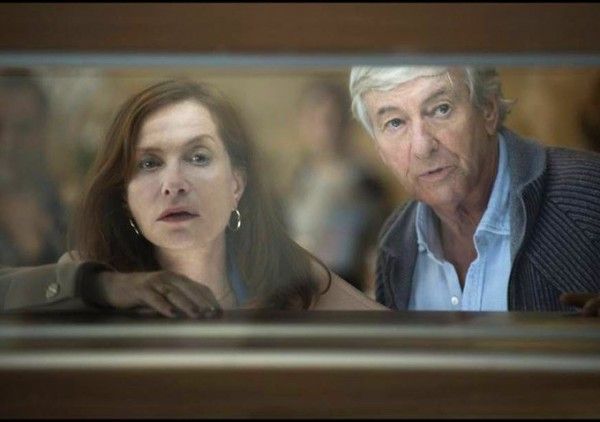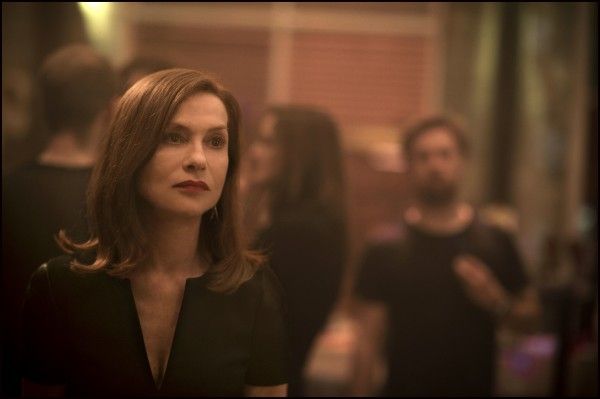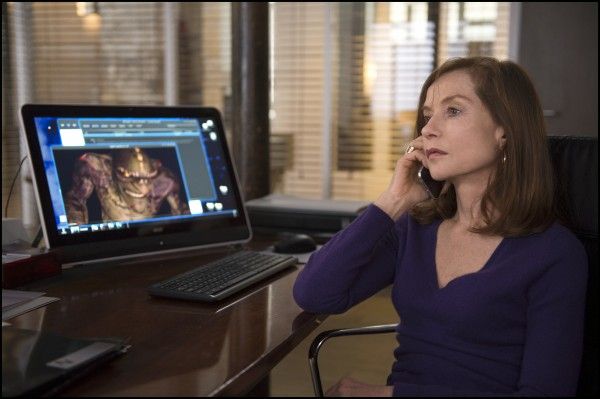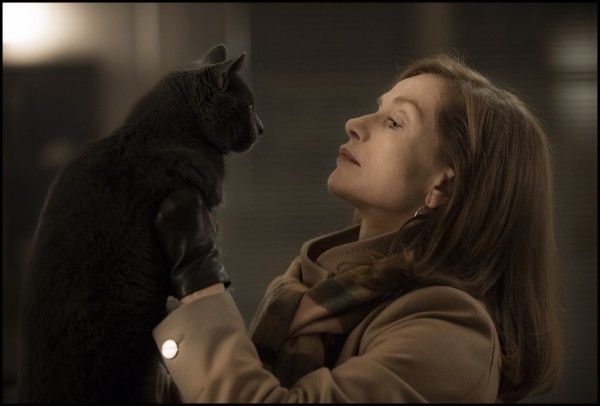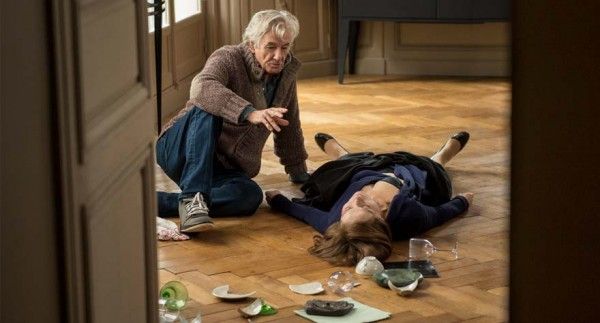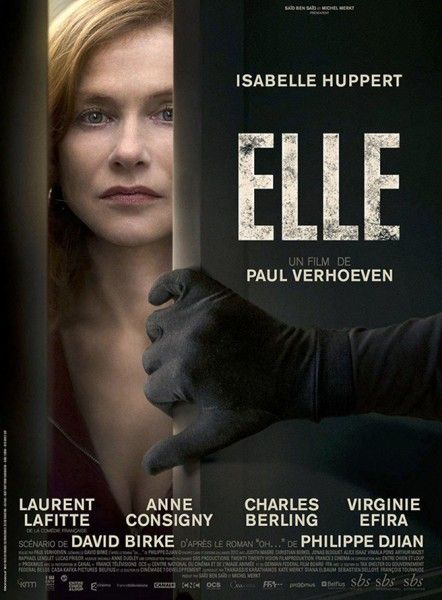Bucket lists. At the Telluride Film Festival I had an interview bucket list conversation with a film fanatic—known to our readers as Red Fury—and I listed Paul Verhoeven as my bucket list director. He is approaching 80-years old and is unlikely to ever work in America again. He's a director I greatly admire and I know any chance to talk with him would be very rare.
Verhoeven is best known stateside for his flexed action films with subversive social commentary, like RoboCop, Total Recall, Starship Troopers and Basic Instinct. They're some of the best mainstream films in the blockbuster era. His decade plus Hollywood output would definitely put him high on my wish list for an interview, but it's his Dutch films that further elevate his stature in my mind. With films like The 4th Man and Turkish Orange he spun Lynch-ian identity crises through extreme sexuality and inwardly tortuous violence, but he also made fun pop films (sans a Hollywood ending) like the motocross saga of Spetters. Yeah, he's a bucket list director for sure. What made interviewing him about his new film, Elle, extra-special was that I actually think it's one of the absolute best movies he's ever made AND I also got to chat with one of the all-time great actresses, Isabelle Huppert.
Elle opens with a rape scene. A masked man leaves his victim, Michele (Huppert) on the floor of her Parisian apartment and exits through the window in which he came. She cleans up. Later she hosts a dinner party so she can tell her friends that she was raped and didn't intend on reporting it. She doesn't want any attention because she'd already gone through a police investigation for something traumatic in her past. Her friends are appalled that she's not going to the authorities or showing the proper amount of grief. There are many more turns in the film that you'll have to see to believe.
Elle features an amazing central performance from Huppert as a detached woman who has compartmentalized a lot through the years and we see her unravel in a completely unexpected way: in full control. Because we put Verhoeven in a subversive box, it might be easy to say that this film about rape and an unusual emotional response to it, is Verhoeven giving the bird to modern decency, but I don't think that's it. This is a character study and he allows Michele to make character decisions that seem true to Huppert's performance—without inserting many extra subversive layers against good taste. Oh, and also it's got some humor to it, too.
Without further adieu, here's our discussion of the film with both Verhoeven and Huppert (with an added bonus of comparing this film to Huppert's slightly similar winter offering, Things to Come). If you would like an additional interview that gets into more questions about Verhoeven's Hollywood career, click here to read Phil Brown's interview from the Toronto International Film Festival. But don't worry, we do discuss sections from RoboCop and Starship Troopers, too.
COLLIDER: First of all, I should commend you, because I think this movie is one of the absolute best films of the year. If not the best.
PAUL VERHOEVEN: Thank you very much.
But also, I’ve loved both of your work for decades, and decades, it’s fantastic to meet you and talk to you. Because you guys are paired let’s start with something smaller: What film of each other’s work do you find to be the most underrated?
VERHOEVEN: Underrated, I think to a certain degree Heaven's Gate is underrated.
ISABELLE HUPPERT: Yeah that’s right, that’s true.
VERHOEVEN: Isabelle and I discussed that once and in fact when we were on the set because the context of the film was immediately lost due to stories of the shoot. I mean, things worked against the movie of course from the beginning before filming, but Variety was savagely counting down the days until release to prepare viewers for this was a horror story. Si when it came out I thought it was underrated because if you look at the movie some of the things are absolutely marvelous—like the cinematography—and although structurally there are some story problems and also in the casting there are some problems, but there were still many commendable things in this movie that was written off before it hit theaters. [To Isabelle] What about mine?
HUPPERT: Well, Showgirls…
VERHOEVEN: Absolutely. Totally underrated.
HUPPERT: Totally underrated.
And now it’s found an entire new audience of cult fans.
HUPPERT: Yeah.
VERHOEVEN: Now in France it’s considered a masterpiece.
HUPPERT: In France people are ready for anything.
VERHOEVEN: I feel there are still problems with that movie, too, but anyway I’m glad that some people like it.
You mention for Heaven’s Gate that the press was preparing some kind of negativity about the film was that something you were worried about with Elle in the US. Have you prepared for a controversy that hasn’t arrived yet? You’ve gone to many film festivals, but here we’re having a larger conversation about sexual assault with a presidential candidate at the very moment that the film will be released…
VERHOEVEN: I’ve been hearing that it’s controversial since we started showing the movie in April, but with audiences after April, the controversy has not started. Actually, you could say that the controversy started in pre-production because it was hard to get an American actress, it was impossible to say "yes" to the part, so we went to France; Isabelle was very keen on doing it. I mean, sure, a controversy could start but basically I haven’t seen any evidence of that and certainly not in the countries where I was with the movie in England, Spain, Germany, France, and in Canada, none. The US is not the same as Canada, so it’s possible; sure, controversy is always possible in America. People love controversy. But I am absolutely not nervous about it, no. [To Isabelle] Are you nervous about it?
HUPPERT: I am not, no. No, I am not because when I’ve traveled with Elle, Paul has been there. If I was just by myself maybe I would be nervous but I think we protect each other. Ever since we’ve been presenting and talking about the movie I’ve been really nicely surprised that people really seem to get what the film is. I think the movie is strong enough and smart enough to make people understand exactly what it is about with no confusion and no misunderstanding. I think the controversy would come from the misunderstanding and I think the movie is clear enough that most of the time there is no misunderstanding. And if there is no misunderstanding [then] there is no controversy.
The rape scene is shown twice and the second time is much more violent. Is there a specific reason you presented the closing seconds of the assault to start as opposed to opening with absolute violence?
VERHOEVEN: Sure, there was a reason to do that but in fact we took that from the book, the novel does that. In fact when I was working with David Birke, the screenwriter, we talked in the beginning that for the movie we put the rape in the beginning. The very first thing, bam! Then we started to realize that it would be much more impersonal because we wouldn’t know the character, we wouldn’t have seen her. Then we start to discover that the writing of Philippe Djian had been extremely clever by starting with the aftermath and then you start to hear about her, you start to know her, you start to sympathize in some way with her, and also kind of cringe at how she handles some things, and then you see the rape. By then, it’s really about a person you know and it works in a completely different way than using it as an opening effect. Dijan really avoids the shock effect and gives you a personal entry to this violence.
Sexual assault is something that’s often presented in film and TV as crass or melodramatic and sometimes leers at a body that’s being violated, so I’m always nervous about knowing that’s a plot point and how it will be presented. But I loved, loved, that a main takeaway from Elle is that individuals treat trauma differently and people might expect someone to react a certain way but this is a very individual response and I feel like there’s no judgment of how Michele reacts. Her family and friends may react like “you should be doing this” but it’s her very specific reaction for Michele as Michele. And I think that’s great to have in a contemporary film, as we discuss assault more openly, we should learn that it’s up to the individual to decide how they’ll move forward.
VERHOEVEN: Ultimately, I’m not so sure that I looked at this movie with any dogmatic way. I really looked at the story and basically stayed true to the story and I could imagine that Michele would react this way. I was very precise in the beginning of the movie to establish a character in four shots. In fact, basically the film starts with the aftermath of the rape and then next thing she does is clean up the room, throw away the dress that she wore, putting that in the garbage bag, taking a bath and wiping away the blood come out of her vagina. I thought basically that sequence was the character; she won’t be defined by her rape but her actions. I think that character I understood. Although I don’t know anybody exactly like that and neither probably do you, but I was convinced that such a woman exists. I mean it’s like many characters in Dostoyevsky’s books that you accept as true, even if that type of character is not in your circle.
HUPPERT: I like that you offer this comparison because sometimes you accept things from literature that you wouldn’t accept from films. Sometimes the literature goes a lot further and nobody bothers you. Yes, take Dostoyevsky’s Crime and Punishment and the events that happen in that you accept easily. For some reason, many people want our film characters to behave more like a reflection of themselves.
Your performance is so strong and so well-directed that you’re right we do have a bit of a semblance of who she is by these four actions of cleaning up, followed by viewing her in the workplace. Did some of the future story shifts inform your hardened take?
HUPPERT: I just let myself be driven by the story. I think before we had started the film if we had sat down, Paul and myself, and began questioning how Michele would be categorized we would have stopped doing the film right away. Because we were completely fresh and open, we let ourselves be surprised by what happened every day, frame-by-frame, scene-by-scene.
VERHOEVEN: It was a discovery, but we were certainly technically prepared, like the color of her hair, the type of lipstick she would wear, the dresses and all of that but let’s say that the real artistry happened on set.
HUPPERT: Even the rape scene we rehearsed many times, that was very technical.
VERHOEVEN: Yes, that was technical sure but because it was dangerous with all the body throwing and falling and all that stuff.
HUPPERT: There was a lot of physical preparation.
[To Verhoeven] I love your Dutch films, to which Elle feels very similar, but an aspect in particular that I love about your American films is the satirical inserts of commercials, fascist videos, etc. You kind of have that a little bit of that in Elle with the true-crime TV program and the violent video games that Michele oversees.
VERHOEVEN: I like to think of these things in terms of full screen, that these inserts need to be seen in full screen. In RoboCop, the commercials were in the script but I wanted to push it and make it as brutal a cut as possible by interrupting the narrative with something that occupies the full screen and doesn’t feature a character. It’s a jarring effect that I like. The same applies to Starship Troopers with the newsreel; it puts you into this world without being told in direct dialogue how the world works.
In the case of Elle, I felt it was interesting to show the video game and use it in a little bit of the same way but use it as part of the scene and still get that disruption. With RoboCop, Total Recall and Starship Troopers these inserts are really interrupting the narrative in an absolute way; it’s a tickle or a shock. And even though I felt that this was a different kind of movie, (screenwriter) David Birke and I felt that we should integrate her work into a full-screen aside. So it’s a residual thing from Starship Troopers and RoboCop that I used. And the same thing with the true crime TV, it’s something Michele is watching that gives us a hint that she’s numb to trauma because she’s already experienced immense trauma. And that’s unusual and new for me to have these inserts add to a character. I mean with the video game we start with a brutal scenario in full screen, something that you’d think might traumatize her after what she’d experienced and we cut from holding that on the entire screen when she says, “the orgasm is not strong enough.” [laughs]
HUPPERT: [laughs]
And she wasn’t involved in video game production in the original book was she?
HUPPERT: No, she was screenwriter for television.
VERHOEVEN: She was a CEO…
HUPPERT: She was running a television company.
VERHOEVEN: But that was not visual enough for me. I like to have extra visuals to play with and basically it was my youngest daughter that proposed to me to make Michele a CEO of a video game company.
Isabelle, you have another film playing festivals this year, Things to Come, which have many similarities with Elle even though the character arcs and tones couldn’t be more opposite, they are each about a woman reacting to a trauma differently than we’re trained to see.
HUPPERT: Yes, they are very similar.
Have you seen it? [To Verhoeven]
VERHOEVEN: No, no.
It’s great.
VERHOEVEN: Yeah. Yeah, I heard.
But it’s another women who sort of very differently responds to things falling apart in a way that is not how we’re used to seeing in film. There’s a cute cat, there’s a dying mother—
VERHOEVEN: I heard there was a cat.
HUPPERT: Yeah, there was a cat and mother’s funeral.
But your performances are both lovely and create wholly defined characters that we can see that they would react exactly as you do in both films.
VERHOEVEN: Same breed of cat?
HUPPERT: Not the same cat actually.
Which cat was a better actor?
HUPPERT: They’re very different cats because our cat was a professional cat in the sense it was a trained cat and it was very impressive to do similar takes over and over. The cat in Things to Come is not a professional so we had to treat it more like a baby actor. That one was also was so heavy I had to carry it like it was an elephant. Our cat was lighter but both cats were really nice. I love cats.
VERHOEVEN: Is she a grey cat?
HUPPERT: That one?
VERHOEVEN: The second cat, the color of the cat.
HUPPERT: The color? It was black it was a huge black cat. It’s a cat of a friend of our. It was so heavy. [laughs] But yes, [in] both [films] the women do not follow the usual pattern of victimized women, that’s for sure. That’s the connection between the two of these films; In Things to Come, she’s new to being alone and finding the joy of being alone and being independent of people. In the case of Elle she’s not dependent on anyone but everyone is dependent on her, so that’s very different. But yes, they don’t want to become a victim and they don’t follow the usual patterns and they react in very unpredictable ways.
Yeah, I saw both of those films really close together and I really enjoyed both of them in very different ways.
Elle is in New York Theaters on November 11 and expands the following weeks.
Things to Come (also starring Huppert) opens in select cities starting December 2.
Additionally, Paul Verhoeven is currently having an entire career retrospective at the Lincoln Film Society that is currently running through November 23rd and is highly recommended if you live in/are visiting New York. Click here for the schedule for "Total Verhoeven."


